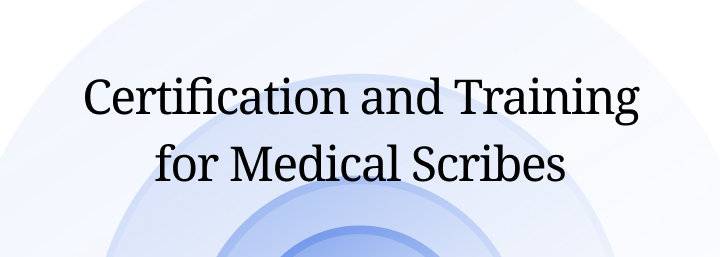The Vital Role of Medical Scribes: Qualifications, and Responsibilities
Table of Contents
As a physician, you find yourself constantly overwhelmed by the vast amount of paperwork and data entry that engulfs your daily routine. Your desire is to dedicate more time to your patients and focus on providing them with the utmost care. Unfortunately, you are confined to a computer screen, tirelessly typing notes, orders, and prescriptions. This predicament leaves you feeling frustrated, exhausted, and burned out.
Now, envision a solution to your predicament - a helping hand to alleviate these burdensome tasks. Picture someone who can accompany you during patient visits, attentively listen to your verbal communication, and diligently document everything into the electronic health record (EHR) system or other medical software. Additionally, this individual can effortlessly retrieve lab results, schedule appointments, and expertly code and bill services.
This much-needed assistant is known as a medical scribe. A medical scribe plays a vital role by supporting physicians and other healthcare providers, efficiently documenting their patient encounters in real-time. Given the numerous advantages they bring, medical scribes are increasingly gaining popularity in the healthcare industry. They serve as a means to reduce the administrative load on physicians, thereby enhancing overall efficiency and the quality of care provided. Yet, what exactly defines a medical scribe, and what qualifications are required to become one?
What is a Medical Scribe?

A medical scribe plays a crucial role in supporting physicians and other healthcare providers by documenting their patient encounters in real-time through the use of an electronic health record (EHR) system or other medical software. In addition to capturing these essential details, a medical scribe is adept at handling various other tasks, including retrieving lab results, scheduling appointments, and proficiently managing coding and billing services. Their multifaceted assistance significantly contributes to streamlining the healthcare workflow and enhancing overall efficiency in the medical practice.
The Role and Responsibilities of A Medical Scribe
The main role of a medical scribe is to accurately and efficiently capture the details of the patient’s history, physical examination, diagnosis, treatment plan, and follow-up instructions as dictated by the physician or provider. A medical scribe also ensures that the documentation meets the standards of quality, compliance, and reimbursement.
Some of the common responsibilities of a medical scribe include:
Accompanying the physician or provider during patient visits and listening attentively to their verbal communication
Entering the relevant information into the EHR system or other medical software using a computer, tablet, or voice recognition technology
Reviewing and editing the documentation for accuracy, completeness, and clarity
Obtaining and updating the patient’s demographic, insurance, and medication information
Facilitating communication between the physician or provider and other members of the healthcare team, such as nurses, pharmacists, and specialists
Performing clerical duties such as answering phone calls, sending faxes, and scanning documents
Different Types of Medical Scribes
Medical scribes can work in various healthcare settings, such as hospitals, clinics, urgent care centers, emergency departments, and specialty practices. Depending on the setting and specialty, medical scribes may have different roles and responsibilities. Some of the common types of medical scribes are:
| Type of Medical Scribe | Work Setting | Role and Responsibilities |
|---|---|---|
Emergency department (ED) scribes | Fast-paced and high-stress environments such as hospitals, trauma centers, and urgent care centers | Document multiple patient encounters in a short period of time; be familiar with emergency medicine terminology, procedures, and protocols; prioritize tasks and multitask effectively |
Outpatient clinic scribes | Ambulatory care settings such as primary care clinics, specialty practices, and community health centers | Document each patient encounter in more detail and time; be knowledgeable about the specific specialty they are working in; communicate well with patients and staff |
Hospitalist scribes | Inpatient settings such as hospitals, nursing homes, and rehabilitation facilities | Follow the physician or provider throughout their rounds; document admission notes, progress notes, discharge summaries, and consult requests; be aware of the hospital policies and regulations |
Tele-scribes | Remote locations such as home or office using a secure internet connection and a video conferencing platform | Provide services to multiple healthcare facilities across different time zones; adapt to different EHR systems and workflows; maintain privacy and confidentiality |
What Are the Qualifications for A Medical Scribe?
In the field of medical scribing, specific qualifications may vary as there is no universal standard set in place. Nevertheless, when hiring medical scribes, most employers tend to look for candidates who possess certain attributes and skills. These qualifications can include but are not limited to the following:
Educational Requirements for Medical Scribes
Navigating the path to becoming a medical scribe involves considering various educational requirements and opportunities. Whether you're a recent high school graduate or someone with a background in health sciences, biology, or related fields, the qualifications for this role can vary. In general, the educational requirements of this field can be summarized as follows:
High school diploma or equivalent
College degree or coursework in health sciences, biology, chemistry, or related fields (optional)
Certification or training program from an accredited institution or organization (optional)
Essential Skills and Abilities for Medical Scribes
The role of a medical scribe demands a diverse range of essential skills and abilities that are crucial to the smooth functioning of healthcare settings. From language proficiency and computer literacy to patient privacy, medical scribes play a vital role in documenting critical information and supporting medical professionals. The most important necessary skills can be stated as follows:
Strong command of language and grammar
Proficient typing speed and computer literacy
Basic understanding of medical terminology, anatomy, physiology, pharmacology, and pathology
Ability to learn quickly and follow instructions
Attention to detail and accuracy
Good interpersonal and communication skills
Professional attitude and appearance
Respect for patient privacy and confidentiality
Certification and Training for Medical Scribes

Although certification is not mandatory for medical scribes, it can demonstrate their competency and credibility to employers and providers. There are several organizations that offer certification programs for medical scribes, such as:
The American College of Medical Scribe Specialists (ACMSS)
The American Healthcare Documentation Professionals Group (AHDPG)
The Medical Scribe Certification & Aptitude Test (MSCAT)
To obtain certification from these organizations, candidates have to meet certain eligibility criteria, complete a training course or program, pass an exam, and maintain their credentials through continuing education.
| Organization | Certification Program | Eligibility Criteria | Training Course or Program |
|---|---|---|---|
Certified Medical Scribe Specialist (CMSS) | High school diploma or equivalent; 200 hours of clinical experience as a medical scribe within the past 12 months; current employment as a medical scribe or an offer letter from an employer; membership with ACMSS | Online or on-site training program approved by ACMSS that covers core competencies of medical scribing such as medical terminology, EHR navigation, HIPAA compliance, etc. | |
The American Healthcare Documentation Professionals Group (AHDPG) | Certified Healthcare Documentation Specialist (CHDS) | High school diploma or equivalent; completion of an AHDPG-approved medical scribe training program or equivalent work experience; membership with AHDPG | Online medical scribe training program offered by AHDPG that covers topics such as medical terminology, anatomy and physiology, pharmacology, EHR functionality, documentation standards, etc. |
The Medical Scribe Certification & Aptitude Test (MSCAT) | Certified Medical Scribe Professional (CMSP) | High school diploma or equivalent; completion of a MSCAT-approved medical scribe training program or equivalent work experience; membership with MSCAT | Online or on-site training program approved by MSCAT that covers topics such as medical terminology, anatomy and physiology, pharmacology, EHR functionality, documentation standards, etc. |
Advantages of Being A Medical Scribe
Being a medical scribe can be a rewarding and fulfilling career choice for many reasons. Some of the advantages of being a medical scribe are:
Personal and Professional Benefits of Working as A Medical Scribe
Working as a medical scribe can be an enriching experience that offers a plethora of personal and professional benefits. From invaluable clinical exposure to the chance of developing vital skills and knowledge, this role opens doors to future educational and career opportunities in the healthcare industry.
Gaining valuable clinical experience and exposure to various medical specialties and settings
Developing skills and knowledge that can enhance your resume and prepare you for further education or career advancement in healthcare
Building relationships and networks with physicians, providers, and other healthcare professionals
Enjoying a flexible and dynamic work environment that offers variety and challenge
Earning a competitive salary and benefits package
Career Prospects For Medical Scribes
Based on statistics, the median wage for medical scribes in the United States is $16.45 an hour. However, what sets this profession apart is the abundance of opportunities it offers beyond the initial job and salary level. Medical scribes have a vast array of potential career paths to explore, both within and outside the healthcare industry. Some of these paths include:
Medical coders and billers
Medical assistants
Health information technicians
Medical records managers
Medical writers and editors
Medical educators and trainers
Medical researchers and analysts
Physicians and other healthcare providers
Conclusion
Medical scribes are an integral part of the healthcare team who assist physicians and healthcare providers with their documentation tasks. They have to meet certain qualifications, such as education, skills, abilities, and certification, to perform their role effectively. They also enjoy many benefits, such as clinical experience, professional development, and career opportunities.
Having gained a comprehensive understanding of the qualifications required for a medical scribe, it's worthwhile to explore the newer and more advanced providers in this field. These cutting-edge tools not only encompass all the necessary competencies but also offer additional advantages to enhance your clinical patient information recording processes. Enter the realm of AI medical scribes, exemplified by innovations like Tali, which bring the potential for further efficiency and improvement to the practice. Tali is a virtual assistant that uses artificial intelligence to generate clinical notes, and medical dictation, helping physicians save time on every patient visit. Tali works with different EHR systems or other medical software. Try Tali today and discover how an AI medical scribe can transform your clinical workflow.
Documentation and Administrative Tasks?